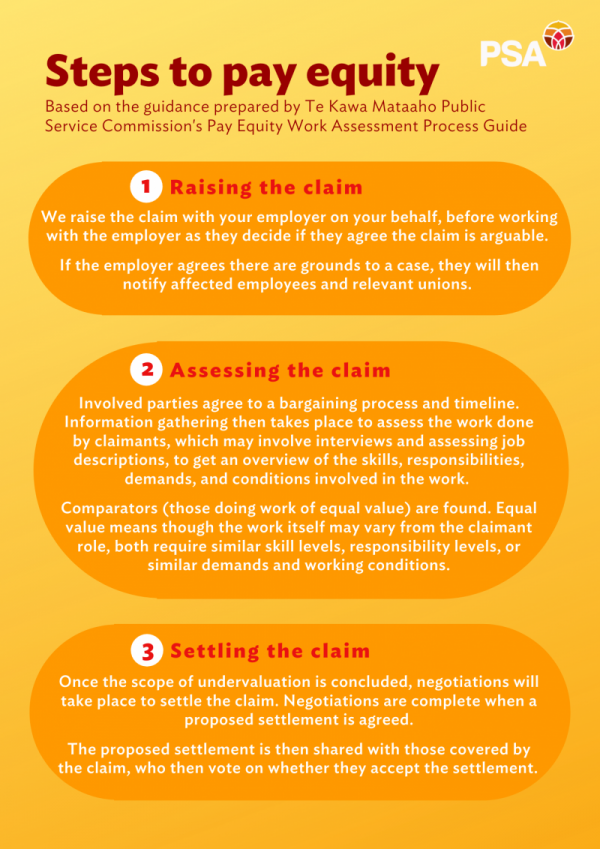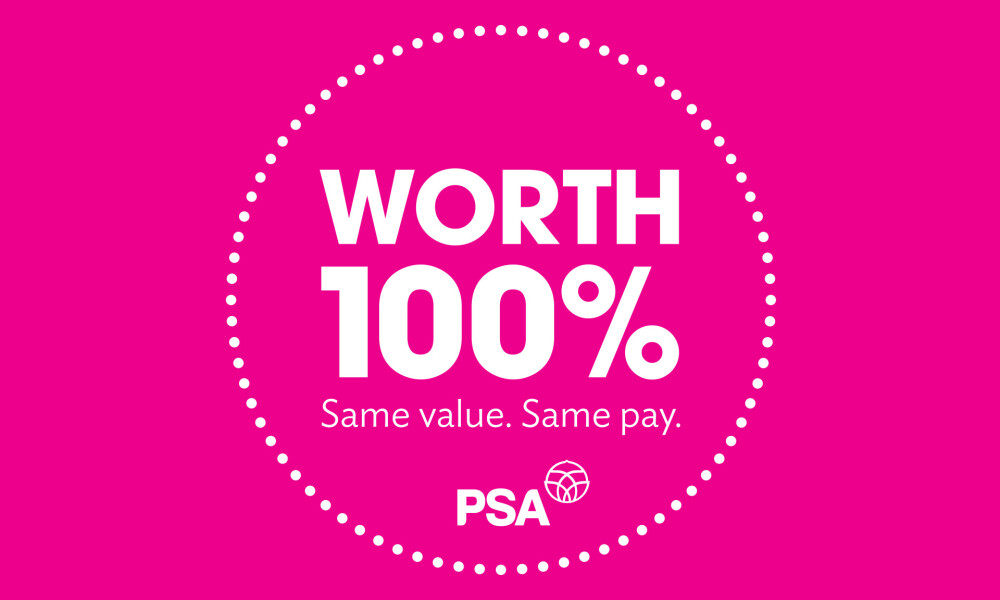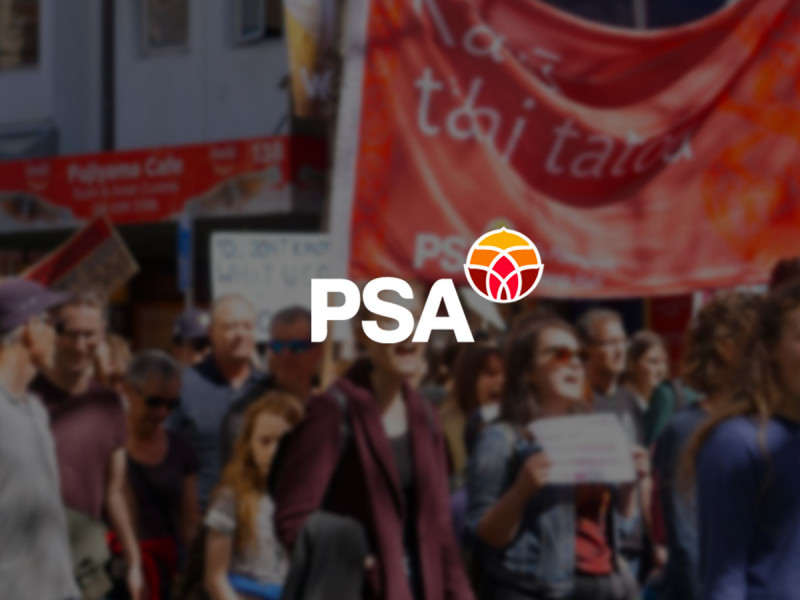Launched in 2014, Worth 100% is our campaign for pay equity across the community, health, local government, public service, and state sectors.
The PSA Te Pūkenga Here Tikanga Mahi has a proud history of advocating for equal pay, striving for pay and employment equality for women since 1913.
It's 2021, and it's time for women to be paid 100%.
Our work towards Equal Pay
Our work towards Equal Pay is currently focused on two core areas of work: Pay Equity Claims, and the Gender Pay Principles (implemented via Gender Pay Action Plans).
Previous work in the Worth 100% campaign includes our work towards the Equal Pay Amendment Bill.
Related documents
-
2019 PSA Equal Pay Kete Adobe Acrobat PDF file | 1.5 MB
-
A Guide to contacting or visiting your Member of Parliament Adobe Acrobat PDF file | 382 KB
-
An Equal Pay Guide for CTU Unions 2019 Adobe Acrobat PDF file | 584 KB
Equal Pay Delivery Plan
The PSA is taking a two-track approach to deliver on pay equity: using the force of new law to settle claims (the Equal Pay Amendment Act) and new guidance to end discrimination (the Gender Pay Principles and Guidance).
Kia Toipoto is the Public Service Action Plan (2021-2024) for closing gender, Māoei, Pacific, and Ethnic pay gaps. Pay equity claims processes and Kia Toipoto, in combination, will address all of the workplace drivers of pay gaps.
Te Orowaru is a revolutionary new pay equity work assessment tool aimed to help recognise the value of cultural skills in work, including te reo Māori. This tool is the first of its kind in Aotearoa New Zealand and the first in the world with a key focus on indigenous peoples.
The pay equity assessment process allows us to look beyond what task someone is doing to understand and properly value work. Pay equity settlements are powerful vehicles for closing gender, Māori, Pacific and ethnic pay gaps, particularly for vulnerable workforces.
Te Orowaru was developed in partnership with Te Kawa Mataaho, the New Zealand Council of Trade Unions and agency pay equity practitioners.
Gender Pay Gap Action Plans are another lever the PSA is using to address employment inequalities. These action plans aim to deliver on equal pay, flexible work arrangements, the elimination of bias in remuneration, and gender-balanced leadership.
It is through Gender Pay Gap Action Plans that the Gender Pay Principles (the framework for eliminating gender pay gaps) are implemented. They are a joint initiative of the PSA and government, in collaboration with agency chief executives.
Most public service departments have completed or are making action plans as required by Government. The plans are expected to make a real difference for women through improvements to starting salaries, the introduction of flexible work by default pilots, and changes to parental leave provisions.
Planning is underway to roll out the gender pay principles to the wider public sector, in line with the Public Service Act. The focus will continue to be on gender inequities but will now include ethnicity as well, working to address inequalities experienced by Māori, Pasefika, and other ethnic groups.
We are also seeking to spread the reach of the gender pay principles into all workplaces, no matter where our members work.
Kia Toipoto and Te Orowaru | Public Service Pay Gap Action Plan (2021-24)
Launched on 15 November 2021, Kia Toipoto is the new gender, Māori, Pasefika and ethnic pay action plan. Te Orowaru is a revolutionary new tool designed to understand and measure the skills, responsibilities, effort and experience workers bring to their workplaces every day in Aotearoa New Zealand. This Action Plan aims to close gender and ethnic pay gaps across the public service, state sector and DHBs, building on the Public Service Gender Pay Gap Action Plan.
Representatives from the PSA's Te Rūnanga o Ngā Toa Āwhina, PSA Pasefika, and PSA members from other ethnic minority groups have helped develop the plan, alongside Te Kawa Mataaho, the Ministry for Women, Te Puni Kōkiri, the Ministry for Pacific Peoples, the Ministry for Ethnic Communities and employee-led networks.
In PSA media:
2021 October | Putting principles into practice
Developed by the Gender Pay Principles Working Group, the Gender Pay Principles are a framework for creating work environments free of gender-based inequalities. The aim of the principles is the elimination of gender pay gaps.
The Gender Pay Principles Working Group is a tripartite working group of unions (including the PSA), agencies, and government, established in 2017 following a PSA legal claim of discrimination against the Public Service.
A set of guidance to implement the principles is now complete, following the publishing of guidance on remuneration, and career progression, breaks and leave. The PSA and Te Kawa Mataaho have developed the guidance in collaboration with other members of the Gender Pay Principles Working Group.
While the guidance talks about gender discrimination, the principles will help eliminate all discrimination. While the Public Service is obliged to use the guidance, it's hoped it will have a flow-on effect for other workers.
The guidance is available here on the Te Kawa Mataaho | Public Service Commission Gender Pay Gap and Pay Equity web page.
The Gender Pay Principles:
- Freedom from bias and discrimination
- Transparency and accessibility
- Relationship between paid and unpaid work
- Sustainability
- Participation and Engagement
Gender Pay Guidance to implement the principles covers:
- Flexible work by default
- Ensuring gender is not a factor in starting salaries
- Ensuring gender is not a factor for same or similar roles
- Recruitment
- Career progression, breaks and leave
- Remuneration
In PSA media:
2018 July 02 | Gender Pay Principles another step towards pay equity
2018 July 03 | Gender Pay Principles launched!
2020 December | Delivering on Equal Pay
2021 October | Putting principles into practice
Equal Pay Advocates are PSA members (male, female, and non-binary) who are the champions of pay equity in big and little ways in their individual workplaces and homes. Several of our sister unions have similar groups of members championing equal pay in their workplaces and our combined efforts can get the whole country behind us and achieve 100% equal pay in the next few years.
Want to become an Equal Pay Advocate? Fill out the form below, or email janine.bridgeman@psa.org.nz and ask to to be added to the Equal Pay Advocates list.
We're pushing for equal pay across our union through a number of pay equity claims. Our union wide strategy can be seen in the raising of claims for NGO social workers and social services workers at five not-for-profit providers. We’re also pursuing our claim for library workers in local government.
The PSA pay equity claims are each at various stages in the process: Raising the claim, Accessing the Claim and Settling the claim.
Our claims in progress:
For more information about a claim in your workplace, log in to MyPSA and look under My Sector and/or My Employer for updates to specific claims.
| Claims in progress | Claim status | Claim details |
| DHB Admin & Clerical | Claim settled Implementing the claim |
Raised April 2018 on behalf of over 6700 clerical/administration members who work in our DHBs. Members should have received a letter confirming the pay step they will be placed on at the end of July. This will enable the review process to commence where members believe they are wrongly placed and we would expect pay adjustments to commence over the next 3 months. |
| DHB Mental & Public Health Nurses | Settling the claim |
Raised in late 2018 on behalf of members covered by the Mental and Public Health Nursing MECA. The settlement of the joint nursing EP claim with NZNO has stalled with the issue of backpay due to be determined by the Employment Court and the Senior Nurse issues going to the Employment Authority. |
| DHB Allied, Public Health, & Technical | Assessing the claim |
Raised in 2018 on behalf of members who are in predominantly female occupations and under the coverage of the Auckland and RONZ Allied, Public Health and Technical MECAs. The MOU regarding the process that was agreed in the Allied |
| Local Government Library Assistants | Assessing the claim | Raised in May 2019 on behalf of library assistants working for Auckland, Tauranga, Hamilton, Wellington, Christchurch or Dunedin councils. |
| Corrections Psychologists | Assessing the claim | A pay equity claim for psychologists at Corrections was made by an individual Corrections psychologist and was accepted by Corrections, at which point the PSA was notified and also lodged a claim for PSA members working as psychologists for the Department of Corrections. |
| Corrections Probation Officers and Senior Practitioners | Assessing the claim | A pay equity claim for Corrections Probation Officers and Senior Practitioners was lodged by NUPE in late 2020 and accepted by Corrections, at which point the PSA was notified and also lodged a claim to cover PSA members working as probation officers and senior practitioners. These claims have been consolidated. Initial discussions have taken place to fit the claims into the work program. |
| Public Service, ACC, & Kainga Ora Admin Clerical | Assessing the claim | Raised October 2019 on behalf of members who "predominantly perform clerical and administrative work (however described or defined) including those who perform customer support work and call centre work”. |
| Social Services Social Workers | Settling the claim |
Raised in 2019 on behalf of members in social work roles for social service providers Barnados, Wellington Sexual Abuse HELP, Christchurch Methodist Mission, Stand for Children and Ngāpuhi Iwi. Cabinet has approved contingency funding for the NGO social worker legal claim and PSA and Employers have reached an in-principle agreement on all matters other than back pay (currently being worked through / exploring options). We are working with TKM to ensure the settlement can be extended to all NGO social workers (general intention this will be agreed in 2022) |
| Social Services Workers | Assessing the claim |
Raised in 2019 on behalf of members in roles that support the delivery of community social services, from assessment and advocacy to administrative and clerical work, at social service providers Barnados, Wellington Sexual Abuse HELP, Christchurch Methodist Mission, Stand for Children and Ngāpuhi Iwi. |
| Care and support | Claim has been raised | The claim has been legally raised with a representative sample of employers. The employers are working on agreeing their multi-employer process agreement. The parties are also working to agree a work plan and resourcing asap. |
Find out about your claim:
For more information about your claim, select the appropriate claim from the list below for more information:
Equal Pay: More information
Having fought for equal pay for over a hundred years, there are many moving parts involved in the campaign for equality. Explore the headings below for more information.
Equal Pay Terminology & The Gender Pay Gap
The terms “Pay Equity and “Equal Pay” are often confused. Equal pay means two people who are doing the same job should be paid the same regardless of their gender. Pay Equity means that women and men should be paid equal pay for work of equal value.
Gender pay gap: Gap between women’s average pay and men’s average pay.
Equal pay: Same job, same pay. (Sometimes, Equal Pay includes Pay Equity.)
Pay equity: Different job but of equal value, same pay.
Job evaluation: Tool to measure job size.
The gender pay gap is the difference between the average hourly rate for women and for men. It’s closing at a snail’s pace, and we’ve still got a long way to go.
Women graduates are paid, on average, 6 per cent less than their male counterparts at the very start of their careers. Within four years, they are earning nearly $5,000 a year less and the gap continues to widen.
In the public sector, women are paid 14 per cent less than men but it’s an average that conceals massive pay gaps, up to a staggering 42 per cent at the Ministry of Defence. In the community public services sector, support work is paid around one-third less than work with similar levels of skills and qualifications but largely done by men.
The gender pay gap represents a huge loss of earnings over a working life that can severely limit a woman’s choices and those of her children. It can mean the difference between a comfortable retirement and scrimping on food and heating costs.
The Pay Equity Process Overview
The arrow diagram below was developed to demonstrate the steps involved when working through the pay equity process. The pay equity arrow diagram does not describe a linear process where one step must be completed before another is started. (From the Te Kawa Mataaho Public Service Commission's Pay Equity Work Assessment Process Guide)
For more information about the process, check out Te Kawa Mataaho's Gender Pay Gap and Pay Equity
Pay Equity Bargaining Process
Pay equity bargaining is different from the processes we normally use for MECA bargaining. This bargaining will be led by a Crown Negotiator who has been appointed by the Government for this purpose, assisted by DHB representatives. The Oversight Group comprising representatives from SCC Treasury, Prime Ministers Office and Ministry of Health will also oversee this process.
The other feature that is different from the normal MECA bargaining process is that that we have jointly, with the DHBs, worked through a very long process to complete the assessment of 13 roles that are representative of the work our clerical admin members do in the DHBs. We have also completed the assessment of the comparator roles and have determined that there is comparability between the work of our clerical admin members and the comparator roles.
We have also collected remuneration data for both the claimant and the comparators and by analysing this data it has been established that, on average, the claimant roles are undervalued. We will be negotiating to remediate the undervaluation.
Pay Equity Bargaining Objectives
We have identified the following broad issues that we will want dealt with through this bargaining process:
- Establish equal pay rates based on finding through the Assessment Phase of the pay equity process.
- An agreed date from which the pay increases will be effective from to correct the undervaluation
- Development of a national pay scale and progression mechanism that caters for the positions covered by our current MECAs
- Establishment of a pay classification system and its link to the pay scale that caters for the positions covered by our current MECAs
- Develop a process for implementing the agreed outcomes on a joint basis that includes dispute resolution and review mechanisms
- Develop a mechanism and timeframe for resolving the detail of a national MECA
- Develop a process and mechanism to maintain and monitor the pay classification and salary structure
The three main stages of the pay equity claim process are:
- Raising the claim
- Assessing the claim
- Settling the claim
Click on the graphic below to expand our Steps to pay equity poster, or read the Pay Equity Work Assessment | Process Guide (pdf) here for more information.
Click to enlarge
The Equal Pay Amendment Act (2020) introduces a practical and accessible process to raise and consider claims of systemic sex-based pay undervaluation in pay in female-dominated occupations.
Introduced to Parliament on 19 September 2019, it passed its third reading in July 2020 before coming into force on 6 November 2020.
The new law enables unions to raise and pursue equal pay claims directly with employers, using a process aligned with New Zealand's existing bargaining framework, rather than going through an adversarial court process. By making court action a last resort, the approach lowers the bar for workers initiating a pay equity claim, and uses a collaborative process more familiar to unions and businesses.
Under the Act, employers, workers and unions negotiate in good faith, with access to mediation and dispute resolution services available if they are unable to agree.
For PSA members who work in female-dominated occupations, this Amendment to the Equal Pay Act of 1972 facilitates achievement of pay equity – similar pay for similar skill level across differing occupations - through a standard job evaluation or job assessment process.
Ahead of the new legislation coming into force, the PSA signed bargaining process agreements with employers to progress our claims for public service administration and clerical workers, local government library assistants, community social service workers and NGO social service workers.
In PSA media:
2018 November 28 | PSA Submission on the Equal Pay Amendment Bill
2020 July 23 | Equal Pay legislation will strengthen the fight against sexist discrimination
2020 September 21 | New law a pathway for pay equity
2020 December | Delivering on Equal Pay





